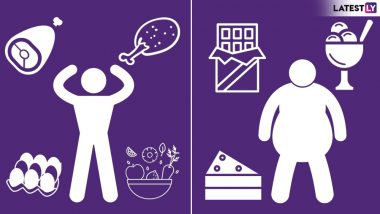You are eating healthy, exercising every day and hydrating yourself. But still, there's no sign of weight loss. Why is that? Weight loss is not rocket science. If you think it is, then you are doing something wrong. The simple trick to losing weight is tracking your calories. Once you start moderating your calorie intake, you will see a marked difference in your weight. This week's weight loss tip is to track your calorie intake. How to Lose Weight Tip #1: Ectomorph, Mesomorph or Endomorph? Identify Your Body Type Before You Start Weight Loss Diet and Workout.
What are Calories?
The energy content in food is known as calories. The simple trick to losing weight is to go on a calorie deficit state.
The food which is eaten is burned during physical activities like exercise. Our body breaks down food molecules and uses the stored energy for many different functions of our body. If we eat more calories than our body requires, it stores the excess calories as fat.
How Many Calories Does Your Body Need?
The amount of calories you require depends upon the energy requirement of your body. The other factors, which plays a vital role in your calorie intake, are age, gender and physical activity habits.
How Many Calories Do You Need to Maintain Your Weight?
The most important tip for weight loss is to eat fewer calories than what your body requires. If your body maintains its weight at 2500 calories, then you should have fewer than 2500 calories for weight loss. For an effective weight loss, you should eat 500-1000 calories lesser, irrespective of whether you exercise or not. The time frame within which you want to lose weight also plays an essential role in deciding your calorie intake.
How To Source Calories
Our body gets calories from macronutrients -- carbs, proteins and fats. One gram of carb provides four calories to your body so does protein. However, one gram of fat feeds your body with eight calories.
Approximately 45-60 percent of your calories should be sourced from carbohydrates, 10-30 percent from your protein and 20-35 percent should come from fat. Ideally, the ratio of macronutrients-carb protein and fat should be maintained at 2:1:1.
It is important to note that there is no such food which can help you gain or lose weight. Some foods are dense in calories and others are sparse. But the amount of food intake also matters. Eating a bar of chocolate when you are keeping your calories in check won't lead to weight gain. But you can exceed your limit of daily calorie intake even by eating "healthy" food. So going overboard on low calorie food can cause weight gain.
If you are planning a weight loss diet, maintain a diary or an app that helps you track your caloric intake. Speak with your dietitian for a well-planned diet that includes essential nutrients.
(The above story first appeared on LatestLY on Mar 24, 2019 08:23 AM IST. For more news and updates on politics, world, sports, entertainment and lifestyle, log on to our website latestly.com).













 Quickly
Quickly


